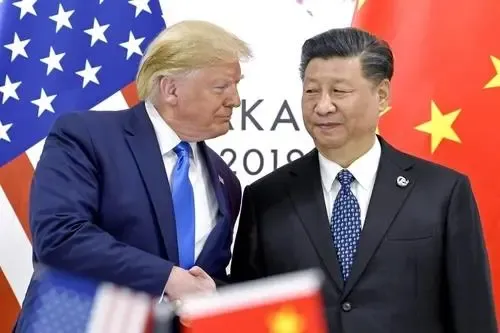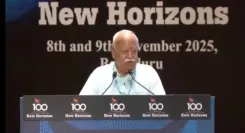Will US and China Use TikTok and Soybeans as Bargaining Chips at the Madrid Summit?

Synopsis
Key Takeaways
- US-China trade talks highlight tensions over TikTok and soybeans.
- China's soybean imports are crucial for US farmers.
- Tariffs remain a significant point of contention.
- Both nations are preparing for a potential summit.
- Geopolitical issues may be sidelined in favor of trade negotiations.
Seoul, Sep 15 (NationPress) Speculation is rife that a strategic confrontation will take place between TikTok, a Chinese-owned application, and American soybeans during the inaugural session of the US-China trade discussions in Madrid, Spain on September 14.
As per various international media reports, including Bloomberg and the South China Morning Post (SCMP), TikTok and soybeans have emerged as significant points of friction amidst ongoing tensions over issues such as the imposition of elevated reciprocal tariffs, constraints on advanced technologies like semiconductor chips for AI in the US, and limitations on rare earth element supplies from China.
The United States has officially raised concerns regarding the forced sale of TikTok, leading China to counter with the issue of importing US soybeans, coinciding with the harvest season, as a strategic leverage.
It is widely believed that the ongoing US-China tariff and trade conflict, a primary concern for the global community, will only be resolved during a meeting between US President Donald Trump and Chinese President Xi Jinping.
Consequently, both nations are hastening to align their agendas ahead of President Trump's anticipated visit to China, likely coinciding with the Asia-Pacific Economic Cooperation (APEC) summit scheduled in Gyeongju, South Korea, from October 31 to November 1.
China has entered into negotiations following its display of an anti-US, non-US coalition at the Shanghai Cooperation Organization (SCO) summit, which was attended by Indian Prime Minister Narendra Modi, and showcased its military capability with an 80th-anniversary parade featuring Russian President Vladimir Putin and North Korean Chairman Kim Jong Un.
On September 9, US Secretary of Defense Pete Hegseth and Chinese Minister of National Defense Dong Jun had a video conference, followed by a call between US Secretary of State Marco Rubio and Wang Yi, the Director of the Foreign Affairs Office of the Communist Party of China, to discuss defense and diplomatic matters before the trade discussions commenced on the 14th.
On the first day of the trade talks in Madrid, the US delegation, led by Treasury Secretary Scott Besant and US Trade Representative Jamieson Greer, engaged in six hours of discussions with the Chinese delegation, headed by Vice Premier He Lifeng.
According to Bloomberg, the Chinese delegation is expected to remain in Spain until the 17th, and a follow-up meeting is anticipated on the 15th.
Diplomatic observers predict that a US-China summit may occur before November 10, marking the end of the 90-day ceasefire in the ongoing tariff and trade dispute established by President Trump's executive order on August 11.
The Trump administration has raised alarms regarding TikTok, owned by ByteDance, a Chinese firm that has gained immense popularity among American youth since 2019.
Notably, President Trump has advocated for a complete ban on TikTok since his first term, citing potential risks of personal information leaks and threats to national security. However, concerns about infringing on freedom of expression as guaranteed by the US Constitution have also played a significant role.
The US government has enacted the 'TikTok Forced Divestment Act', citing national security issues. President Trump has extended the deadline for TikTok's US business rights divestment three times, with the final extension set to conclude on the 17th of this month.
In light of these developments, it appears the Trump administration is intent on pressuring Chinese officials through tariff and trade negotiations to compel TikTok to voluntarily divest from the US market, as reported by the Yonhap news agency.
In retaliation, China has threatened legal action, perceiving the pressure to sell TikTok as an unfair attack on its technologies and firms, infringing on its sovereignty, and has expressed a strong resolve to take actions, including suspending TikTok's services in the US.
Meanwhile, China is applying considerable pressure in the discussions regarding the importation of US soybeans.
This trend is reflected in an editorial published on the 15th by the Global Times, a state-controlled media outlet linked to the Chinese Communist Party, which emphasized that “American soybean farmers are missing the chance to sell billions of dollars worth of soybeans, despite the harvest season,” attributing this to the US trade war with China.
The editorial further indicated that US soybean farmers are anxious about preparing for harvest without purchase orders from China.
Indeed, President Trump remarked on August 11 that he hopes China will promptly quadruple its soybean orders, yet China has been weighing its response without immediate action.
Data from the General Administration of Customs of China reveals that from January to July this year, China's soybean imports totaled 61.03 million tons, with Brazilian soybeans making up 70% and American soybeans just over 25%.
Once the largest supplier of soybeans to China, the US has seen its position altered due to ongoing tariff and trade disputes.
China, the world’s leading soybean importer, asserts that it is diversifying its sources of imports, though analysts suggest that its underlying strategy is to weaponize soybeans.
The international community remains most focused on the reciprocal tariff rates that the US will impose on China.
President Trump's hardline stance led to triple-digit retaliatory tariffs being imposed by both nations, though temporary adjustments were made through two rounds of 90-day tariff truces.
Following President Trump's executive order on August 11, both countries continue negotiations while maintaining existing reciprocal tariffs of 30% and 10%, respectively.
On April 4, China escalated pressure on the Trump administration by imposing export controls on seven of the 17 rare earth elements bound for the US. In exchange for lifting those restrictions, China obtained export licenses for Nvidia's H20 AI chips. China, which dominates the rare earth supply chain, has made no secret of its readiness to utilize rare earths as a weapon against the US at any time.
Given that the focus of the US and China delegations at the Madrid summit is primarily on economic and trade concerns, there are doubts regarding serious discussions on issues like the South China Sea territorial dispute and the Taiwan issue.
In this context, further discussions between the US and China are anticipated through defense and diplomatic channels.
However, finding common ground will likely prove challenging for the US, which has consistently opposed China's claims of sovereignty over the South China Sea, reinforcing its commitment to freedom of navigation.
With regard to Taiwan, it is widely accepted that a unilateral agenda coordination ahead of the US-China summit will be unfeasible, considering the US's stance against China's ambitions to unify Taiwan by force.









